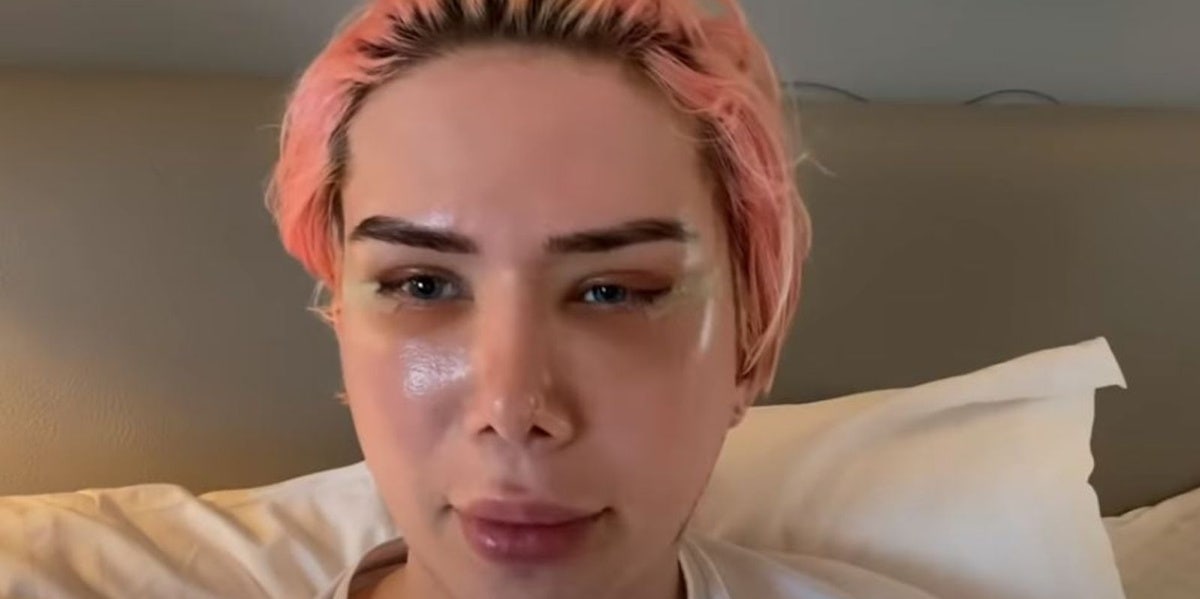White Influencer Oli London Had 18 Surgeries To Look Like K-Pop Star — Offensively 'Identifies As Korean'
Here's why 'transracial' is not a thing.
 YouTube / Oli London
YouTube / Oli London British influencer Oli London is facing backlash after claiming to identify as Korean and undergoing what they’ve labeled a “racial transitional surgery.”
London shared a YouTube video revealing they have undergone plastic surgery 18 times in order to replicate the facial features of BTS singer Park Ji-min, or Jimin.
London has gained notoriety in the K-Pop fandom for previous stunts including marrying a cardboard cutout of Park and appearing on reality TV to show off their expensive surgeries.
Why Oli London is getting backlash for ‘identifying as Korean.’
In the video, London talked about getting a brow lift, face lift, and more as they claimed they had lived in Korea and speak the language so they feel adequately prepared to live life as a Korean.
"I know a lot of people don't understand me, but I do identify as Korean and I do look Korean now, I do feel Korean,” they said. "That's just my culture. That's my home country. That's exactly how I look now. And I also identify as Jimin, that's my career name."
Across social media, outrage ensued as London was accused of cultural appropriation and making a mockery of Korean identities.
But the controversial influencer also stirred up a debate that has existed on the peripheries of racial and gender discourse since former NAACP president Rachel Dolezal’s infamous claim that she was “transracial” after it was exposed that she was a white woman pretending to be Black.
‘Transracial’ vs ‘transgender’ — why they’re not the same.
The conversation around so-called “transracial” identities has become an avenue for transphobia as many question why it is socially acceptable to identify as a gender other than the one assigned to you at birth, but unacceptable to identify as a different race than your own.
If we accept one, why not accept the other?
The question is not entirely unreasonable; however, it misses some vital differences between the transgender experience and someone acting out a different race.
Not all social constructs are the same.
The go-to argument to draw parallels between “transracial” and transgender is to point out that both are social constructs, so we should be able to pick and choose between each freely.
But there are plenty of other social constructs from money to time that don’t have much in common with one another. Gender and racial identities are experienced entirely differently.
As transgender Black YouTuber Kat Blaque points out, “Gender is not a biological trait passed from parent to child, whereas race is.”
In order to actively pass as a different race, a “transracial” person must identify themselves with one race while denying ancestry of another.
On the other hand, when a transgender person transitions they are aligning their internal and inborn gender identity with their outwardly physical appearance.
Transgender people are not ‘passing’ as a different gender.
The idea that there is a parallel between putting on fake tan or box braids to become a different race and getting gender affirmation surgery dangerously discredits the trans experience.
Being transgender does not begin at the point of transition. It is not dressing up as another gender or acting out an experience that is not your own.
Someone like Dolezal can wash off their makeup and resume life as a white woman if it no longer serves her to “be Black,” but being transgender is an innate part of one’s being that doesn’t change if a person alters what they’re wearing.
Studies show that the brains of transgender people are more aligned with their gender identity than they are with the gender they were assigned at birth.
Meanwhile, additional research shows that there are very few biological differences between races.
This means that gender identity operates within us regardless of how we are perceived by others. Racial identity can only be experienced socially.
‘Transracial’ is born from white privilege.
The act of claiming to identify as a different race is steeped in privilege.
While transgender people experience poverty and unemployment in high numbers, the examples of so-called "transracial" people have largely profited off their actions.
Dolezal managed to make a living as a presumed Black woman teaching about an identity she only knows about tangentially, while experiencing no anti-Blackness throughout her childhood.
London has gained notoriety and clout by reducing Korean identity to surgeries and K-Pop, while knowing nothing about how it feels to live as a Korean.
Alice Kelly is a writer living in Brooklyn, New York. Catch her covering all things social justice, news, and entertainment. Keep up with her Twitter for more.
